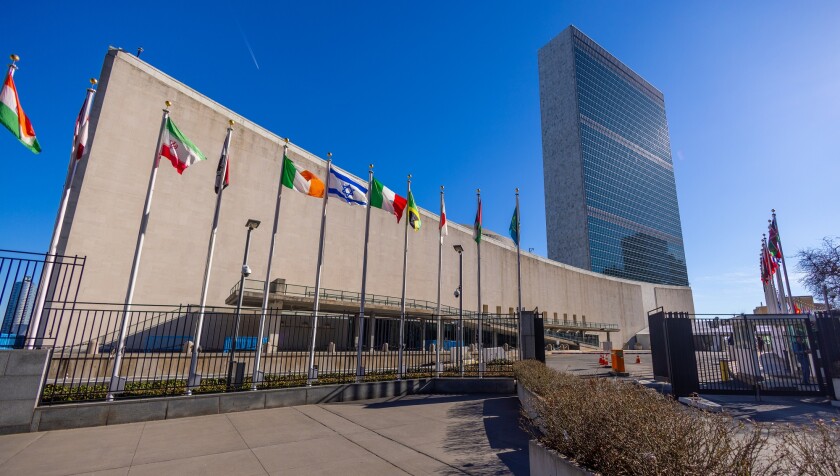The UN should establish a new framework for setting international tax policy and helping countries cooperate on global tax matters, argued UN chief António Guterres in a draft report published on Tuesday, August 8.
Guterres proposed three options to expand the UN’s tax policy remit. Option one would be to establish a legally binding UN multilateral convention to regulate tax issues, including setting rules on taxing rights.
The second option would be a legally binding framework for international tax cooperation to create a new system of tax governance. This could serve as a convention to enable governments to coordinate on tax policy.
Meanwhile, option three would be a non-binding framework for global tax cooperation to allow greater variation in tackling problems such as illicit financial flows.
The UN General Assembly is set to discuss these options at the next session starting in September.
UK retailers hit out at ‘tourist tax’
The UK government has been warned that its decision to ditch VAT-free shopping for tourists is continuing to hold UK retailers back, reported newspaper City AM yesterday, August 10.
A study by the Centre for Economics and Business Research has revealed that the removal, which has been dubbed the “tourist tax”, is costing the UK £10.7 billion ($13.6 billion) in lost GDP and putting off two million tourists from visiting each year.
Brian Duffy, CEO of FTSE 250 luxury watch seller Watches of Switzerland, told City AM this week that it is “probably the biggest single frustration” for the British retail sector.
“I was in Italy this weekend and the amount of American tourists that were shopping was very visible and the UK is not getting anywhere near its fair share of that,” he said.
Heathrow Airport Chief Commercial Officer Ross Baker also recently spoke out on the issue, describing the ditching of the scheme as “disastrous” for the UK’s competitiveness.
The government scrapped the VAT refund for tourists in 2021, when Prime Minister Rishi Sunak was chancellor of the exchequer.
Japan protests Russia’s tax treaty suspension
Japanese Chief Cabinet Secretary Hirokazu Matsuno said on Wednesday, August 9, that Japan has lodged a protest with Russia over the decision to suspend the tax treaty between the two countries.
It comes after President Vladimir Putin suspended 38 double taxation agreements with countries that have sanctioned Russia in response to the war in Ukraine. The move, which saw Putin sign a decree, was reported by Russian state news agency RIA on Tuesday, August 8.
According to the decree, the suspension of tax treaties was necessary to respond to “unfriendly actions by a number of foreign states”.
“It is regrettable that Russia decided to unilaterally suspend certain provisions of the Japan-Russia tax treaty, which is an unjustified measure that could be detrimental to Japanese citizens and businesses,” Matsuno told a press conference on Wednesday, August 9.
“Japan lodged a protest against Russia through diplomatic channels and asked them to withdraw their decision,” he said.
Bermuda set to introduce corporate tax in 2025
The Bermudian government is considering a corporate tax rate of between 9% and 15% as part of its commitment to the OECD’s two-pillar solution.
Premier David Burt confirmed the plan to introduce corporate tax in 2025, in a Bloomberg interview on Tuesday, August 8. It would be the first time the levy had ever been applied in the tax haven, though the government is seeking public input in a consultation process.
Around 2,000 companies may fall within scope of the regime, but many details have yet to be settled, including the precise headline rate. A corporate levy below 15% would require a top-up tax to comply with the global minimum rate.
“We must attract and retain business in Bermuda, boost foreign investment, increase employment opportunities while expanding the workforce, and build our local economy to its fullest potential,” said Burt in an official statement.
The public consultation will close on September 8.
Investors slam Italy’s banking windfall tax
Some of the largest international investors in Italy's banks have slammed the nation's plan for a windfall tax on the financial sector, claiming that the levy will increase uncertainty and risk damaging a sector that was finally picking up speed.
Prime Minister Giorgia Meloni’s coalition announced the 40% levy on interest margins on Monday, August 7, before watering down the proposal a day later to sure up shocked markets.
As a result of Monday’s announcement, Italy’s two largest banks, Intesa Sanpaolo and UniCredit, saw their shares drop by 7.5% and 5.8% respectively on Tuesday, August 8.
Meanwhile, other banks were down by as much as 11% before shares rebounded on Wednesday, August 9, after the government said the levy would be capped at 0.1% of a bank’s total assets.
David Herro, chief investment officer at US investment manager Harris Associates, the sixth-largest shareholder in Italy’s Intesa Sanpaolo, told the Financial Times that the policy was “tragic”.
“For years the banks struggled in a low interest rate environment. No one begged, nor should they have, for subsidies,” he added. “Now we finally have some normalisation and the government confiscates profits.”
Jérôme Legras, managing partner at Axiom Alternative Investments, which owns shares in the nation's two largest banks, told the FT that “policymakers didn’t handle it very well”.
“It’s all a bit of a mess. The numbers weren’t clear, they took everyone by surprise in the middle of the summer and it was a strange way of announcing it,” said Legras.
Next week in ITR
ITR is following up on the UN report on international tax cooperation with analysis of what it means for the balance of power in policymaking worldwide.
We will continue to keep a close eye on the OECD’s work on the two-pillar solution to taxing the digital economy, as well as the fallout from the Australian tax leaks scandal.
Readers can expect these stories and plenty more next week. Don’t miss out on the key developments. Sign up for a free trial to ITR.











